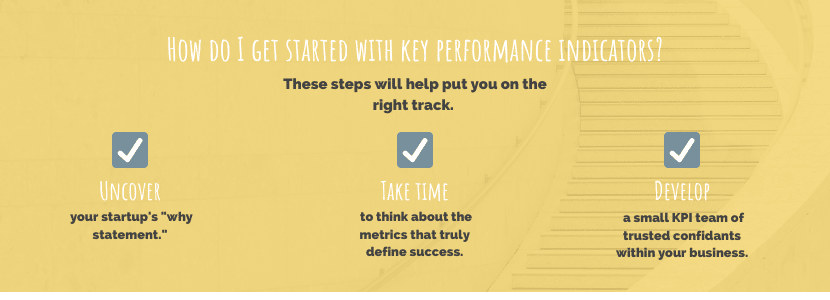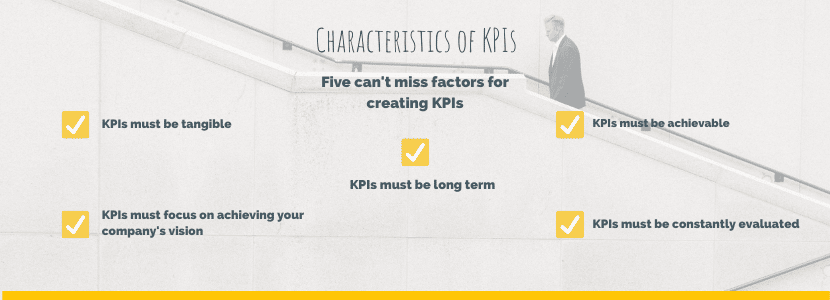If there’s one lesson we’ve learned as startup business consultant, it’s this: Your startup business can’t achieve goals that it hasn’t defined. Setting vague goals typically results in one thing.
- An endlessly moving goalpost that you never seem to reach
- An inaccurate sense of how well you’re doing, so you end up settling for “good enough” rather than achieving your true potential
So how can you set clear, transparent goals when it comes to marketing for startup companies? By using Key Performance Indicators, or KPIs.
KPIs help you set goals and articulate them to others. After all, if you can’t communicate your goals to your employees, investors, or target audience, they won’t be able to help you achieve them.
Learn about key performance indicators from a business consulting for startups expert
 Key performance indicators are a business’ best attempt at identifying tangible metrics that will paint a clear and accurate picture of the company’s long-term performance. KPIs are based around quantifiable goals, and can measure:
Key performance indicators are a business’ best attempt at identifying tangible metrics that will paint a clear and accurate picture of the company’s long-term performance. KPIs are based around quantifiable goals, and can measure:
- Actual performance compared to target numbers
- Current performance compared to past performance
- Performance compared to others in the industry
If you are an agency specializing in business consulting for startups, utilizing key performance indicators when marketing a startup is an essential component of any consulting firm’s strategy. However, you must regularly reevaluate your KPIs and adjust them as needed so your company stays on track.
Characteristics of KPIs
Before adding key performance indicators to your startup business plans, let’s take a quick look at important factors that make them successful.
KPIs must be tangible
One of the most important characteristics of KPIs is that they must be based around tangible goals.
For example, the goal of “more sales” isn’t quantifiable, so it’s not a KPI. But a simple tweak can turn it into a measurable KPI of “20% increase in sales meetings each year.”
Notice how “more” isn’t a tangible figure, whereas “20%” is? Tangible figures will be invaluable as you track long-term patterns in your business.
KPIs must focus on achieving your company’s vision
KPIs must connect to how your staff should operate within your business, and how your business should operate within your industry.
Using the example above, your thinking might run along the lines of, “A 20% increase in sales meetings will help us reach the revenue goals so we can invest in our first office. Then we’ll be able to meet with higher value clients and have space to grow our team.”
From the top down, each employee’s role needs to connect to the company’s operations strategy. Everything your team does must reflect back to the goals you’re trying to achieve.
KPIs must be long-term
Key performance indicators are, by nature, meant to measure long-term goals that are “key” to your business’s success. If you can complete a KPI tomorrow, then it’s not a KPI.
For example, “increase new contracts by 10% each quarter” is a KPI, whereas “close the Smith deal by the end of the week” isn’t.
The number of new contracts your business is bringing in is very likely important to your overall business goals, but your business’ success is unlikely to hinge on the one Smith contract.
KPIs must be achievable
It’s important that KPIs are attainable; otherwise, a sense of frustration may lead you down the path of giving up on your business dreams.
Effective KPIs are small ones that build upon each other. Think of taking baby steps towards your larger goals over time, leading your marketing for startup companies strategy to reach its potential.
KPIs must be constantly evaluated
Any startup business consultant will tell you that frequently changing your key performance indicators will not benefit your startup. It can be difficult to accurately track improvements made by constantly changing the measure of success. However, it is important to frequently evaluate performance and how it lines up with your key performance indicators.
Let’s take our previous example of “20% yearly increase in sales meetings” which seems like a good KPI, but what if it didn’t actually increase sales. When you dive deeper, you may find that your sales manager was pushing his / her team so hard for sales meetings, that they were being set with friends and family who had no intent to purchase, in order to hit their numbers.
It is important to note that regardless of the business type, if a Key Performance Indicator isn’t contributing to your long-term goals a startup business consultant will most likely advise adjusting or replacing the KPI. Alternatively, you can seek assistance from agencies like Take the Stairs, which provides small business startup consulting services. Remember, KPIs aren’t an exact science, so it’s normal for them to require some adjustments, especially for a brand-new startup business.
How would a startup business consultant recommend I start using KPIs?
Follow these steps to learn how a business consulting for startups agency incorporates key performance indicators into its business plan when designing a marketing strategy for startups:

Uncover your startup’s “why statement” with our firm
A successful startup business needs a “why statement,” that articulates its purpose and values. So, when considering how to market a startup company, remember that this statement will let your employees and the world-at-large know what your values are and why you’re doing what you’re doing.
When everyone in the business knows the “why” behind what they are doing, it boosts motivation, enabling teams to easily focus on what truly matters for the success of the business, including effectively marketing your startup company.
Take time to think about the metrics that truly define success
Take the Stairs, an agency specializing in startup business consulting services has noted that Key Performance Indicators (KPIs) for startup companies typically require adjustments as time progresses. However, you can greatly enhance your initial progress by dedicating time to contemplate your objectives and how you define ‘success’ for yourself.
The more clear you are on your idea of success, the easier it will be to define metrics that can measure your progress.
Develop a small KPI team
Developing a small team of trusted confidants within your business can help you validate your KPIs and provide essential oversight into how they’re performing. For the clearest picture, meet regularly (monthly, quarterly, or even annually) so you can quickly discern patterns and plan accordingly.
Work with Take The Stairs to develop a business plan for marketing startups
Not sure where to start with your current operations strategy or new startup business plan? Take the Stairs startup consulting services can help you take that crucial first step in marketing for a startup company.
 As one of the leading business consulting for startup agencies, our workshops and strategies, specifically designed for marketing startup companies, will get your business on track. Whether you’re just starting out or you’ve been struggling to get it just right, our experienced startup business consultant can help get your company on the road to success. We’ll help you:
As one of the leading business consulting for startup agencies, our workshops and strategies, specifically designed for marketing startup companies, will get your business on track. Whether you’re just starting out or you’ve been struggling to get it just right, our experienced startup business consultant can help get your company on the road to success. We’ll help you:
- Develop KPIs
- Discover your “why” statement
- Formulate an effective operations strategy
- Construct or tweak your startup business plan
To find out more about how our startup business consultant can help take your company to the next level, schedule a free, no-obligation discovery meeting today.










